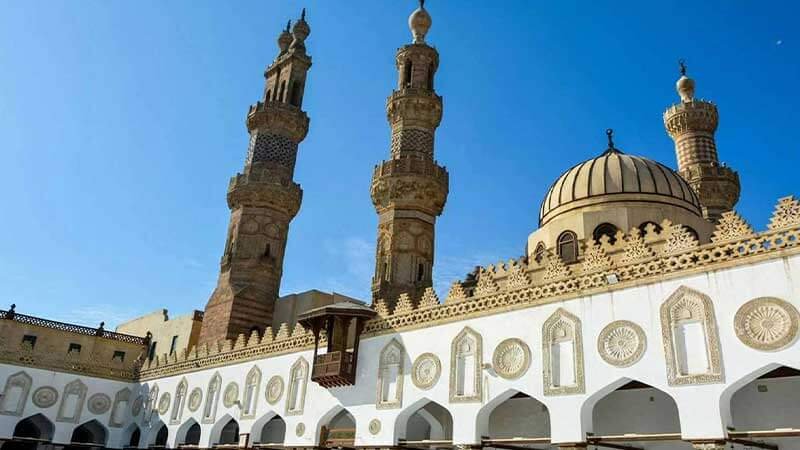Nestled in the heart of Old Cairo, Egypt, the Al Azhar Mosque is an enduring testament to history’s passage and a silent witness to the unfolding of centuries of events. This iconic mosque, known as Al-Azhar, is not merely an architectural marvel; it is a global center for spiritual enlightenment and education, profoundly impacting the lives of Muslims worldwide. This comprehensive article will delve into the intricate details and captivating facets of the Al Azhar Mosque, exploring its historical roots, architectural magnificence, cultural significance, and pivotal role in shaping the Islamic world.
Don’t forget to read our related blogs:
Historical Roots of Al Azhar Mosque

Founded in 970 AD by the Fatimid Caliphate, the name “Al Azhar” itself, translating to “The Resplendent” in Arabic, signifies enlightenment, knowledge, and spiritual guidance. Throughout its existence, it has served as a place of worship and an eminent center for Islamic studies, continuously evolving to meet the educational needs of its time.
Architectural Splendor
The architectural design of the Al Azhar Mosque is a testament to the ingenuity and craftsmanship of ancient Islamic builders. Reflecting diverse architectural styles, including influences from the Fatimid, Mamluk, and Ottoman eras, the mosque’s grand courtyard, elegant minarets, and intricate geometric patterns on its walls all harmonize to showcase the grandeur of Islamic architecture.
Rich Historical Tapestry
Spanning over a millennium, the Al Azhar Mosque has witnessed numerous historical events, enduring political transitions while remaining a sanctuary for scholars and pilgrims alike. What initially began as a hub for religious education has blossomed into one of the world’s most renowned Islamic universities.
A Center of Learning
The mosque was pivotal in spreading knowledge and wisdom in the Islamic world. It marked the birth of one of the earliest universities in human history, attracting scholars, theologians, and students from diverse corners of the globe, fostering intellectual exchange, and preserving Islamic teachings.
Cultural Significance
The Al Azhar Mosque is an architectural wonder and a cultural icon symbolizing the spiritual and intellectual heritage of the Islamic world. It has inspired artists, writers, and thinkers throughout history, influencing literature, art, and the socio-political fabric of Islamic societies.
Guiding the Islamic World

Al Azhar Mosque occupies a distinctive place in the Islamic world as a center for religious and academic affairs. It has consistently remained at the forefront of Islamic jurisprudence and theology, guiding millions of Muslims worldwide. The mosque’s renowned scholars and teachings have profoundly impacted religious practices and interpretations across different cultures.
Iconic Features
The mosque’s architectural highlights include its expansive courtyard adorned with lush greenery and a central fountain, offering a serene ambiance for worshipers and students. Two iconic minarets majestically rise into the Cairo skyline, providing picturesque city views. The exquisitely decorated mihrab, indicating the direction of Mecca, serves as the focal point of prayer. The mosque’s central dome, a masterpiece of architecture, represents the celestial realm, inspiring awe in all who behold it.
Global Influence
Over the centuries, the Al Azhar Mosque has transcended its Egyptian origins to become an emblem of Islamic culture and heritage worldwide. Students and scholars from diverse cultures have sought knowledge within its walls, carrying its teachings and values to distant lands.
Al Azhar Mosque in the Modern Era
Even in the modern age, the Al Azhar Mosque retains its significance as a beacon of wisdom and spirituality. Leveraging technological advancements, the mosque reaches a global audience through online lectures and academic resources.
Frequently Asked Questions (FAQs)
What is the historical significance of the Al Azhar Mosque?
Al Azhar Mosque holds immense historical importance as one of the oldest universities in the world and a center for Islamic education and scholarship.
Can non-Muslims visit the Al Azhar Mosque?
Non-Muslims are welcome to visit the mosque’s courtyard and admire its architectural splendor. However, access to prayer areas may be restricted.
Is the Mosque a UNESCO World Heritage Site?
While the Mosque is a significant cultural landmark, it is not currently designated as a UNESCO World Heritage Site.
How has Al Azhar Mosque influenced Islamic art and architecture?
The mosque’s unique architectural elements and intricate designs have inspired countless artists and architects in the Islamic world.
Can women study at Al Azhar University?
Al Azhar University offers education to both male and female students, promoting gender equality in Islamic education.
How has Al Azhar Mosque adapted to modern educational needs?
The Mosque has embraced technology to disseminate knowledge globally through online courses and digital resources.
Conclusion
In conclusion, the Al Azhar Mosque stands as a timeless testament to the brilliance of Islamic architecture, a center of learning, and a symbol of Islamic culture and heritage. Its significance transcends the confines of Cairo, impacting the lives of millions of Muslims and leaving an indelible mark on the world. The Al Azhar Mosque inspires generations as a beacon of enlightenment and spirituality, fostering a legacy of knowledge, tolerance, and unity.


